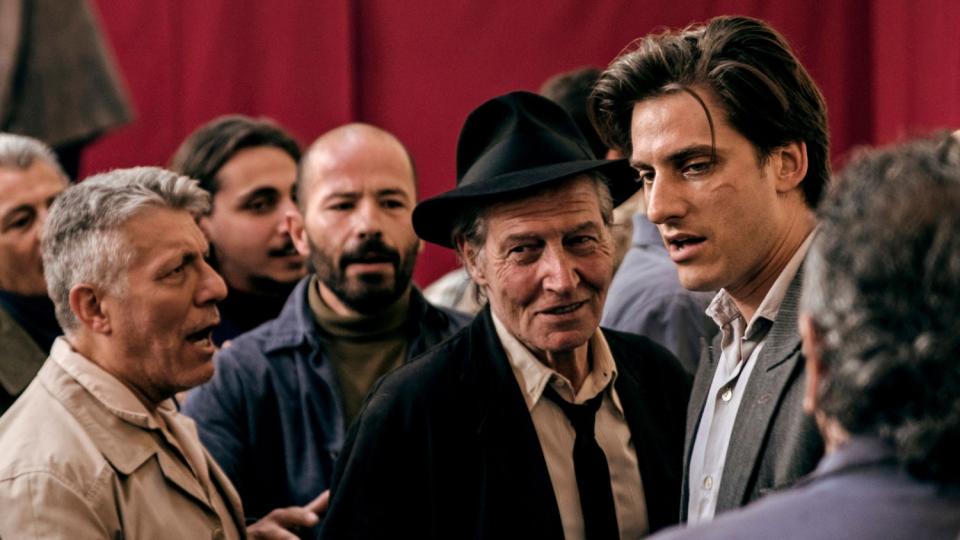Review: 'Martin Eden' is a story of self-defeat — and a triumphant adaptation of Jack London's novel

- Oops!Something went wrong.Please try again later.
The opening moments of “Martin Eden” feature a trove of documentary images filmed in 1921, in the Italian port city of Savona: a throng of workers waving flags at a rally, a locomotive rumbling toward its destination. These fleeting glimpses of a young, still-industrializing century have been folded into a fictional story that appears to be taking place sometime later, judging by some of the inventions we see: a magnetic tape recorder, an adjustable desk lamp, a television set. But it’s the conceit of this vibrant and passionate film, directed with mad brio by Pietro Marcello, that no meaningful difference between past and present or between fiction and nonfiction, really exists. It’s as if the whole 20th century had been distilled, or scrambled, into an eternal, mercurial now.
Where are we? When are we? This disorientation is very much the film’s point and one of its many pleasures. Jack London's novel “Martin Eden” was published in 1909, a marker that proves as insignificant here as the book’s Northern California setting. In relocating the action to the Campania region of southern Italy and deliberately muddling the time frames, Marcello and his cowriter, Maurizio Braucci, pursue a wilder, more radical kind of faithfulness. The novel was already its own semi-autobiographical hall of mirrors, refracting London’s rise-and-fall journey through that of a restless, misguided and intensely captivating alter ego. This latest of many movie adaptations attempts an even bolder transformation: luminously shot (by Francesco Di Giacomo and Alessandro Abate) on 16-millimeter film, it’s both a richly textured bildungsroman and a rambling cultural, political and historical panorama.
Perhaps most of all, it’s a dazzling showcase for Luca Marinelli, whose magnetic performance in the title role earned him the best actor prize at last year’s Venice International Film Festival. You might have seen Marinelli recently as one of the immortal warriors in “The Old Guard,” and here he offers a different picture of a man out of step with his moment. Martin Eden (“Eh-den,” as he’s called here) seems in his element at first; he’s a towering physical specimen, a handsome, strapping sailor who delights in the open sea but proves just as comfortable on land, where he spends one night romancing a local beauty (Denise Sardisco). He awakens the next morning on the pier, just in time to defend a young man from being accosted by a guard.

The young man, Arturo Orsini (Giustiniano Alpi), repays Martin by inviting him to his wealthy family’s estate, which overflows with books, paintings and sculptures. Martin is awestruck by these totems of high culture and also by Arturo’s exquisitely beautiful sister, Elena (an excellent Jessica Cressy), who looks with gentle amusement — but also real, ardent feeling — at this young man with his rough manners, muscular build and intoxicating life force. Elena introduces him to Baudelaire, corrects his grammar and encourages him to get an education. Martin sets out to do just that, becoming a voracious reader and, in time, an aspiring writer, in hopes that it will make him worthy of Elena’s mind and heart.
One of the novel’s best qualities is how brilliantly it dramatizes Martin’s intellectual hunger, a lust for knowledge that matches and sometimes even surpasses his desire for the woman he loves. It’s a tougher thing for a film to convey, but this one comes closer than most. Martin’s “incessant march through the kingdom of knowledge” is measured not only in the books he carts around but also in his travels through the countryside and the back-breaking jobs he takes on to support his writing. It’s measured too in the French phrases he practices with Elena, his near-comical stream of rejection letters from publishers and the blaze of excitement in his piercing blue eyes, whether he’s peering down at his typewriter or out into a world that seems, for the first time, within his grasp.
Not that the world makes it easy. Martin lives with an older sister and a loathsome brother-in-law who belittles his studies and ultimately kicks him out. Education might be liberating but it comes at a far greater cost to Martin than it does to the Orsinis, who regard his aspirations wanly at best (Elena) and contemptuously at worst (her parents). His lowly origins are a burden, a source of shame, resentment and despair. They are also a source of solidarity, as demonstrated by Maria (Carmen Pommella), a kindly widow who takes him in, and as preached by Russ Brissenden (Carlo Cecchi), an aging, dyspeptic writer who urges Martin to align himself and his writing with the socialist cause.
Martin is thus pulled in many directions by dueling philosophies and political worldviews — a tension that Marinelli captures in a performance of furious physicality and relentless determination, his will seeming to harden in scene after scene. Once he gets his first story published, it doesn’t take long for him to become a literary sensation or for his contentment to curdle into disillusionment. The twin poles of his experience have essentially canceled each other out: He is now too loftily educated for his working-class kin but he is also disgusted by the cultural elites whose tastes and manners he has learned to appropriate. Martin’s beauty seems to waste away before us; his skin pales, his teeth rot and his eyes, once so alert and alive, become clouded with self-loathing. Time, so loose and indeterminate until now, suddenly seems to speed up, bearing down on Martin and ushering him toward his tragic fate.

An ostensible success story that becomes a chronicle of human failure, “Martin Eden” was in some sense London’s own thinly veiled self-indictment; in another sense, it was an attack on the cultural industry that shaped his destiny. Most of all it was his condemnation of individualism, a point lost on most readers who fell under the spell of his wayward hero. Marcello’s approach is nuanced but unambiguous: By allowing time to fold in on itself, engaging history itself as his subject, he speaks as much to the present as to the past. He amplifies the extraordinary prescience of the novel, which anticipated — in the story of one man and his nihilistic pursuit of his own self-interest — how tides of violent fascism could infect a nation under the guise of sweeping social reform.
Over the past two decades, Marcello has made a number of poetic, formally inventive documentaries, like “The Mouth of the Wolf” (2009), that call attention to lives lived on the margins of Italian society. “Martin Eden” might be a vastly more ambitious canvas, but the director’s fracturing of form continues. He channels both the empathetic spirit of Italian neorealism and, through his restless editing (by Aline Hervé and Fabrizio Federico), the stylistic energy of the French New Wave — two movements that were keen on exploding familiar cinematic conventions and speaking to audiences with a revelatory new transparency. That faded but impeccably color-graded archival footage we see at the beginning is woven through Martin’s journey throughout, in moments that fondly evoke his childhood memories. But they are also an homage to cinema itself, the most democratic of art forms, and its ability to reflect the commonality of all human experience.
That ability is pointedly called into question in one remarkable sequence, in which Martin and Elena emerge from a cinema arguing over the picture they just saw. She loves the movie's hopefulness, while he sees it as a sentimental lie, a reminder of how rarely art captures the brutal rawness of life. “Culture and emancipation shall have nothing to do with each other!” he declares, not without good reason: Culture, after all, so often feeds on the experiences of the downtrodden, only to be consumed by an aristocratic few. But hopefulness and rawness, much like society and the self, are ultimately inextricable in “Martin Eden,” a work of art that abounds in its own beautiful contradictions. It might reject individualism, but it’s also a glorious singularity.
This story originally appeared in Los Angeles Times.

